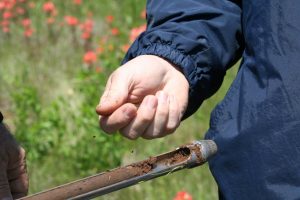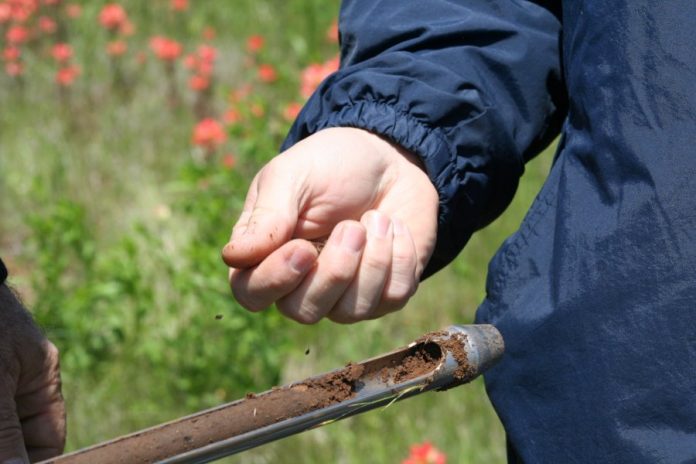 by David Annis, Denton County Extension Agent – Agriculture & Natural Resources
by David Annis, Denton County Extension Agent – Agriculture & Natural Resources
The Samuel Roberts Noble Foundation and Denton County AgriLife Extension is teaming up to have a Soil Testing Meeting on Thursday, February 23, at the Joseph A. Carroll Building, Room 115, 401 West Hickory in Denton from 6:30 p.m. to 8:30 p.m.
As such, we’re offering, for a very limited time, free soil testing – up to five free samples! (Normally, you have to mail the soil samples and a minimum of $10 to the Texas A&M AgriLife Extension Service, Soil, Water and Forage Testing Laboratory at College Station for analysis and recommendations.)
Those that take soil samples and bring them to the Denton County AgriLife Extension office, and register for the class, by noon on February 9, will receive this free soil testing service. A light meal hosted by the Denton County Agriculture Demonstration Committee will be served. While there, Dr. Eddie Funderburg, Senior Soils and Crops Consultant, SR Noble Foundation and David Annis, AgriLife Extension, Denton County will discuss pH, nitrogen, phosphorus and potassium. These two will hand out the results, discuss the nutrients and pH, results of the soil samples and better define the recommendations.
Pastures, gardens, lawns and crops – soil testing is more important now than ever. We need to know how much fertilizer that we need to apply– not only from the economic standpoint but to ensure that we protect the environment!
Soil testing can tell us very important things about the soil in which the plants are growing. A common question that is asked of me is, “David, when they test my soil, what tests need to be run?” I recommend that you look at pH, nitrogen, phosphorus and potassium first (as long as you haven’t identified a specific nutrient deficiency). The pH will give you an idea of how acidic or basic the soil is. This can affect the availability of different nutrients to the plant.
Perhaps a better way to think of plant nutrients would be to compare them to what they do in a vehicle. If you would like, think of nitrogen as gas in the tank of a vehicle – it will get it going. Phosphorus can be considered like the oil in the vehicle. Potassium, like the battery on a vehicle. Unless you have these three nutrients in the right levels, your “vehicle” (plant in this case) isn’t going to grow.
I don’t worry that much about nitrogen levels unless I’ve taken the sample immediately before planting or the springtime green up of pastures. Phosphorus is most needed by small plants and is almost immobile in the soil. Like potassium, the only way to get these two nutrients in the groundwater is through erosion
It is important to take a soil test in the right manner. If you don’t, the old phrase, “Garbage in, garbage out,” applies. When you take a soil test, keep the number of acres less than 40. Easy to do in a garden or lawn situation but in large pastures and fields, not so much. We recommend that you take 20 cores with a soil probe down to a depth of 6 inches and then place these in a clean, plastic bucket. A soil probe makes sampling much easier, not to mention faster!
The reason we want you to sample to a depth of 6 inches (not 5 ½ or less nor 6 ½ or deeper) is that the testing laboratories are calibrated to this depth. One acre of soil, six inches deep has approximately two million pounds of soil in that area! Take a pint to a quart of soil to test and you are basically letting that one to two-pound sample cover up to 80 million pounds of soil!
I mentioned that you should use a clean plastic bucket. The galvanization in the bucket, and even the residual feed from a feed sack can throw off the soil test numbers.
Just remember: Unless you test, it’s just a guess!
Texas A&M AgriLife Extension – Denton County
940-349-2894







 GIF.gif)










